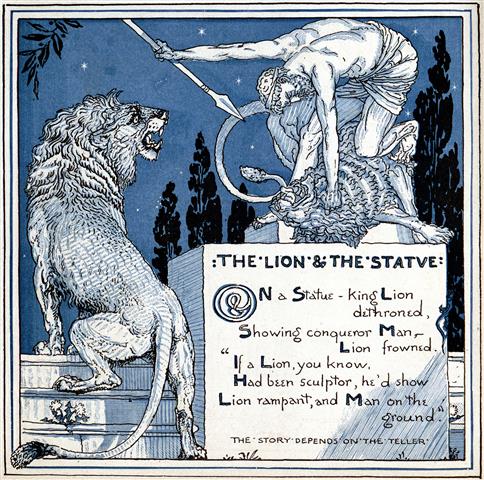The Forester and the Lion (from the Fables of Aesop)

Ի՞նչ շահ պարծիլ նախնեաց վրան,
Երբ ինքն անխելք չգիտէ մէկ բան։
Մարդն ու առիւծը միատեղ
Հին ատենը Հերքիւլէս անունով կտրիճը առիւծ մը մեռցուցեր էր. ասոր քարէ շինած արձանը շատ տեղ դրած կար, որ տեսնողները սիրտ առնեն։ Օրինակ է անոնց որ իրենց նախնեացը մեծութեան վրայ կը պարծին, եւ իրենք բանի մը շահ չունին։
The Forester meeting with a Lion one day, they discoursed together for awhile without differing much in opinion. At last, a dispute happening to arise about the superiority between a Man and a Lion, the Man, wanting a better argument, showed the Lion a marble monument, on which was placed the statue of a man striding over a vanquished Lion.—'If this,' says the Lion, 'is all you have to say for it, let us be the carvers, and we will make the Lion striding over the Man.'
Contending parties are very apt to appeal for the truth to records written by their own side; but nothing is more unfair, and at the same time insignificant and unconvincing. Such is the partiality of mankind in favour of themselves and their own actions, that it is almost impossible to come at any certainty by reading the accounts which are written on one side only. We have few or no memoirs come down to us of what was transacted in the world during the sovereignty of ancient Rome, but what were written by those who had a dependency upon it; therefore it is no wonder that they appear, upon most occasions, to have been so great and glorious a nation. What their contemporaries of other countries thought of them we cannot tell, otherwise than from their own writers: it is not impossible but they might have described them as a barbarous, rapacious, treacherous, unpolite people; who, upon their conquest of Greece, for some time, made as great havoc and destruction of the arts and sciences, as their fellow plunderers, the Goths and Vandals, did afterwards in Italy. What monsters would our own party-zealots make of each other, if the transactions of the times were to be handed down to posterity by a warm hearty man on either side! and, were such records to survive two or three centuries, with what perplexities and difficulties must they embarrass a young historian, as by turns he consulted them for the characters of his great forefathers! If it should so happen, it were to be wished this application might be living at the same time that young readers, instead of doubting to which they should give their credit, would not fail to remember that this was the work of a man, that of a lion.


Comments
Post a Comment